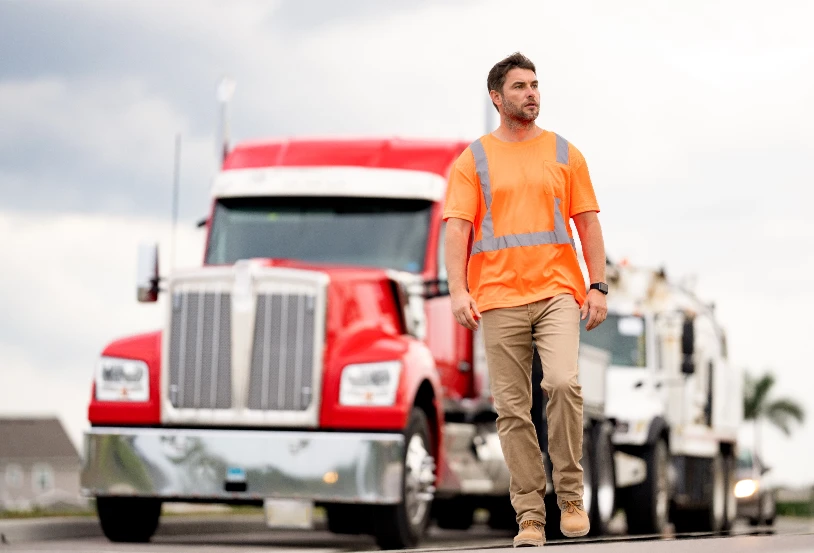


Co-Brokering
RPP Express’s co-brokering service is a strategic solution designed to streamline the freight transportation process while ensuring the utmost security and confidentiality for all parties involved. Co-brokering is a partnership between RPP Express and freight brokers aimed at providing efficient and reliable logistics services.
One of the key advantages of choosing our co-brokering service is its ability to provide highly competitive pricing without compromising on attention to detail. Handling each shipment with the utmost care, we ensure that clients receive cost-effective solutions without sacrificing quality. Our comprehensive services cover pick-up and delivery anywhere in the USA, Canada, and Mexico, supported by a network of over 1700 exclusive expedited trucks, including Sprinter vans, box trucks, and straight trucks, both regular and reefer. Additionally, RPP Express specializes in the final mile and white-glove delivery services, offering end-to-end solutions for diverse transportation needs.
Let's Partner With us!WHY USE OUR SERVICE?
We haul freight on smaller vehicles that are not limited by semi-truck restriction
We are looking at 15% to 20% cheaper rates than the semi-truck market
We work with experienced and vetted owner-operators who had safety/security training from our team.
Our introduction of a co-brokerage agreement underscores our commitment to the safety and confidentiality of our clients. Opting for a co-brokerage arrangement ensures that client information is protected and remains confidential.

WHY A CO-BROKERAGE AGREEMENT?
- To ensure both parties are safe. Your client’s information stays protected and confidential, and we won’t contact them directly unless you ask.
- We offer access to our exclusive trucks. We don’t double broker / re-sell your loads on open load boards (e.g., DAT or TruckStop).
We want our co-brokering service to be a reliable and secure solution for freight transportation needs. With our focus on responsiveness, competitive pricing, and a commitment to safeguarding client information, we provide a comprehensive and trustworthy co-brokering experience from our company’s perspective.
Let's Partner with Us!THE DIFFERENCE BETWEEN
CO-BROKERING AND DOUBLE BROKERING
CO-BROKERING
Co-brokering is when two or more brokers collaborate on a shipment, each playing a role in the transportation process.
What characterizes co-brokering
Collaboration
In a co-brokering scenario, the brokers work together to secure the transportation service. One broker might find the shipper, while the other identifies a carrier to transport the goods.
Revenue sharing
The brokers involved typically share the commission or profit generated from the transaction, and the specific arrangement is agreed upon between the parties involved.
Transparency
Co-brokering is generally transparent, as all parties are aware of each other's involvement in the transaction.
Benefits of co-brokering
Wider network and reach
Co-brokering allows access to a broader network of carriers.
Increased capacity
With multiple brokers working together, the capacity to handle more shipments increases.
Risk mitigation
Sharing the responsibility of finding suitable carriers and managing shipments can help mitigate risks.
Risk mitigation
Shared resources, such as technology platforms, administrative support, and market insights, can result in cost savings.
Business growth opportunities
Brokers can leverage each other's networks and customer bases, leading to new clients and increased business volume.
DOUBLE BROKERING
Double brokering refers to a situation where a broker contracts with a carrier to move a load and then subcontracts the same load to another carrier without the knowledge or consent of the original shipper.
What characterizes double broking

Lack of transparency
In double brokering, the second broker (the one who is not in direct contact with the shipper) may not disclose to the carrier or the shipper that they are not the primary broker responsible for the transportation service.

Risk of fraud
Double brokering can be considered unethical and may even be illegal in some jurisdictions. It can lead to issues such as fraud, payment disputes, and service failures.

Trust issues
Since the shipper may not be aware of the involvement of multiple brokers, double brokering can erode trust within the industry and lead to a breakdown in relationships.
Risks of double brokering

Payment issues
Double brokering can lead to payment disputes as the original broker may not receive the full payment from the shipper, leading to difficulties in compensating the carrier appropriately.

Unreliable service
The carrier engaged by the secondary broker may not meet the standards expected by the shipper or the original broker, leading to potential service quality issues.

Legal consequences
Double brokering can be illegal in some jurisdictions or may violate contracts between the shipper, broker, and carrier.

Security risks
Lack of transparency in the transportation chain increases the risk of security breaches, theft, or damage to the cargo, as the original broker may not have full visibility into the handling and transportation conditions.

Reputational damage
If a shipper experiences problems with a shipment due to double brokering, it can result in damage to the reputations of both brokers involved.
LET'S PARTNER WITH US!
StartCopyright © 2026
Privacy policyThank you!
We have received your order.
Our manager will follow up with you shortly.
Thank you!
Our manager will follow up with you shortly.
Thank you!
We have received your order.
Our manager will follow up with you shortly.
Thank you!
Your request has been sent.
Thank you!
Our HR manager will follow up with you shortly.
Thank you!
Our HR manager will follow up with you shortly.
Thank you!
Our manager will follow up with you shortly.